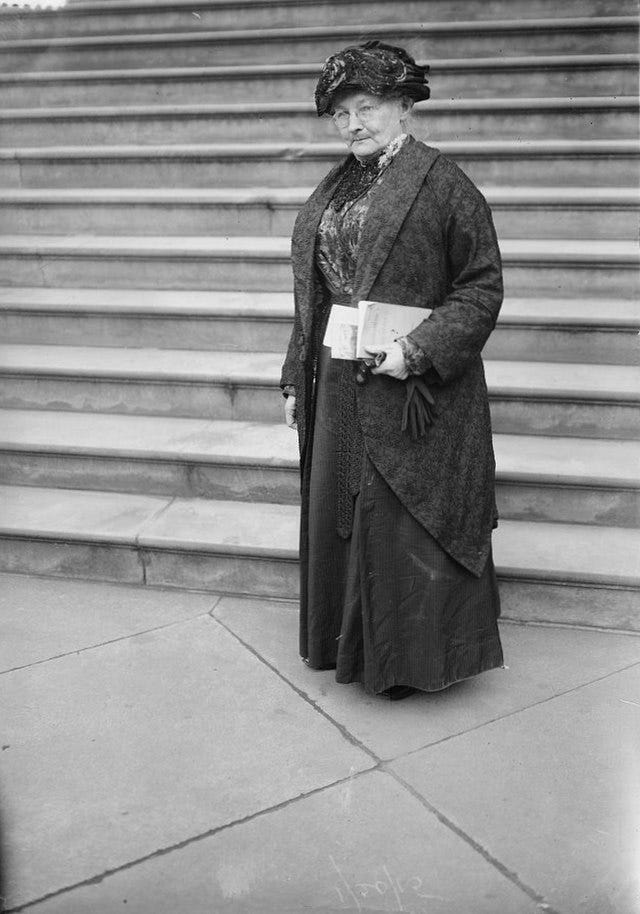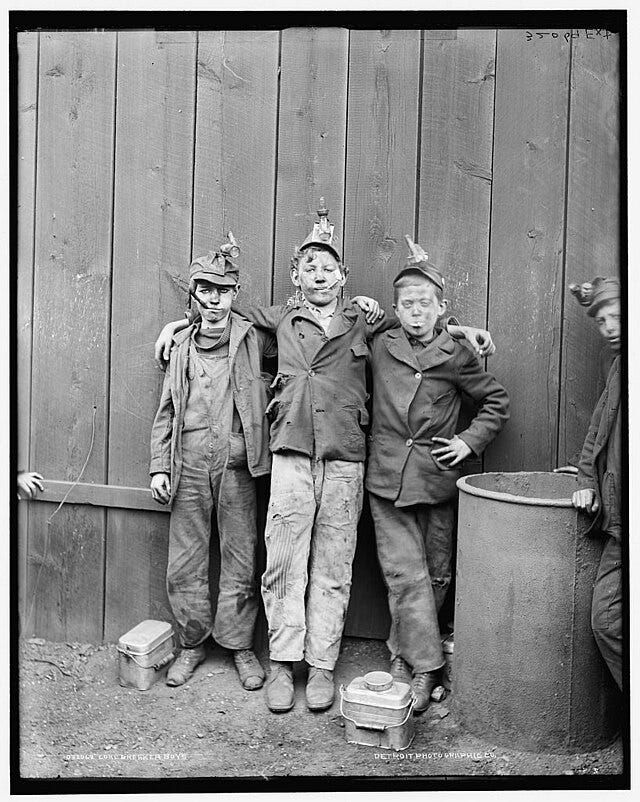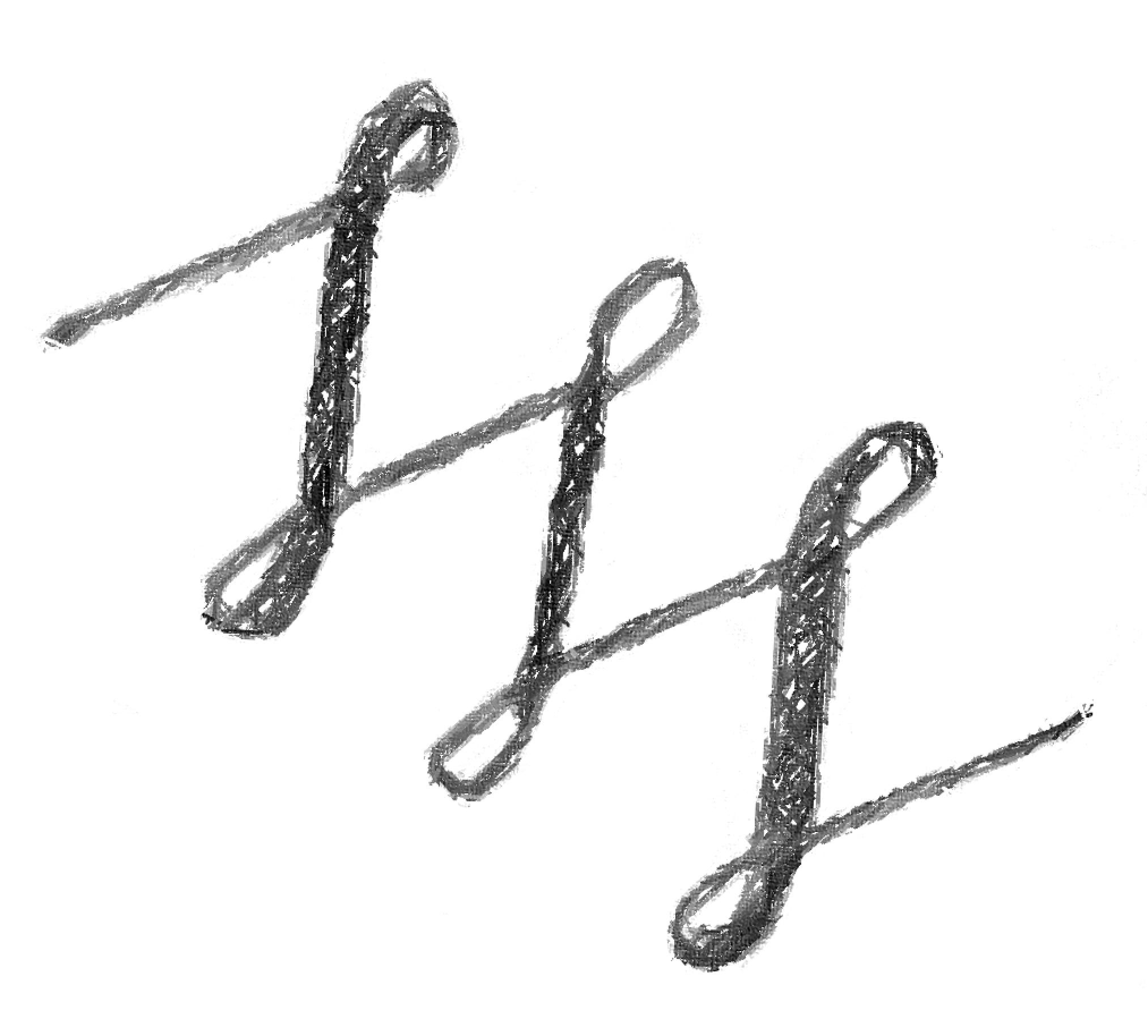Welcome to new subscribers and regular readers! Thank you for joining me for today’s song, “Agitator” by Ronnie Gilbert, Libby McLauren, and Si Kahn (1994). If you’d like to hear the song before you read about it, I’ve included a YouTube video below the article.
Below, you’ll find my interpretation of the lyrics which are written in italics. For Japanese students, vocabulary words in bold are provided in Japanese below. TOEIC (PBT) 450+, Eiken 2, CEFR B1.
(629 words)
Her real name was Mary Harris Jones, and she was a very brave and strong woman who fought for workers. Long ago, and even today, many people worked in dangerous places like mines and factories. They didn't get paid much, and their bosses didn't always treat them fairly. Mother Jones saw this and thought it was wrong. She wanted to help them have better lives.
Even small children were working in mines. Mother Jones thought this was terrible. She traveled all over the United States, talking to workers and telling them they deserved better. She organized strikes in which people stopped working and demanded changes.
She was very good at giving speeches. She could talk to big crowds of workers. She told them they had the power to make things better. She even led marches, walking with the workers to show everyone how important their rights were.
Mother Jones was tough. She didn't care if people called her names or tried to stop her. She kept fighting for what she believed in. She helped make laws that protected children and made workplaces safer.
The song begins with an image of people working down in a dark, dark mine. The third line says boy at the breaker. A boy at a breaker would typically sort coal by hand, separating pieces of different sizes and qualities. This work was often physically hard and dirty, with boys working long hours in dangerous conditions.
Down in the holler (valley) where the sun never shines
She took her stand with the men in the mines
With the boy at the breaker, the girl in the mill
She hollered (shouted) so loud, you can hear her still
And they called her “Agitator!” (They said…)
“Bend the knee” means to show that you accept the power of someone in charge. It comes from long ago when people would kneel down in front of a king or lord to show they were loyal to them.
Mother Jones…how’d she get so strong?
Mother Jones…how’d she live so long?
Mother Jones never bent her knee
Mother Jones taught them to be
How to be free
There was a big union that was formed in 1905. It was called the Industrial Workers of the World (IWW). Their nickname was The Wobblies. They wanted to unite all workers, regardless of skill, race, gender, or class, in order to improve the lives of all workers. Most jobs at the time, for example, lumberjacks, miners, and dockworkers, did not have any group to represent them if there was a problem between the company and the workers. The IWW was a strong organization that organized strikes, Those strikes often resulted in increases in pay and working conditions, for example, during the Bread and Roses Strike. Some, but not all, of the members were also communists, and people called them “Reds”. Many of the leaders of the IWW and other unions were called “agitators”. An agitator urges others to join the protests or to fight to improve their working conditions.
Some called her Wobbly, some called her Red
Some said they’d love to see her dead
She wasn’t scared of their guns
She never shed any tears
And she lived to be near 100 years
As a god-damned agitator
The last verse compares the person who acts as an “agitator” to a part of the washing machine. It’s also called and “agitator”. In a humorous way, the song says that both have much the same function.
You know the washing machine where you wash your shirt?
Well, it’s the stick in the middle that does the work
It tugs and it twists, and it may be mean
But it loosens the dirt, gets the shirt darn clean
And they call it an agitator
Questions for discussion
1) Can you name some important women in your culture who tried to make working conditions better for workers?
2) Discuss the positive and negative aspects of strikes.
Vocabulary
deserve 値する
demand 要求する
crowd 群衆
coal 石炭
holler 谷、叫び声
mill 工場
agitator 扇動者、撹拌機
loyal 忠実な
bend the knee (someone)に屈服する
lumberjack 木こり
miner 鉱夫
dockworker 港湾労働者
communist 共産主義者
tug 引き
be mean 意地悪になる
loosen 緩める
Sources
Ducksters. (2025). Industrial Revolution: Breaker Boys, Matchgirls, and Newsies for Kids. Ducksters. Retrieved from https://www.ducksters.com/history/us_1800s/breaker_boys_matchgirls_newsies.php . Accessed 5 March 2025.
Gilbert, R., & Kahn, S. (1993). Ronnie Gilbert on Mother Jones: Face to face with the most dangerous woman in America. Conari Press.
Kornbluh, J. L., Thompson, F., & Rosemont, F. (2011a). Rebel voices: An IWW anthology. PM Press.
Mother Jones: AFL-CIO. AFL. (n.d.). https://aflcio.org/about/history/labor-history-people/mother-jones#:~:text=In%20her%2080s%2C%20Mother%20Jones,to%20travel%20across%20the%20country.&text=Mother%20Jones’%20organizing%20methods%20were,women%20and%20children%20in%20strikes . Accessed 5 March 2025.
Women’s History Month: Honoring the legacies of Mother Jones and Frances Perkins. The United Food & Commercial Workers International Union. (2020, September 8). https://www.ufcw.org/womens-history-month-honoring-the-legacies-of-mother-jones-and-frances-perkins/ . Accessed 5 March 2025.
英検2級以上 | 名曲で英語を学ぶ | TOEIC
I believe that education should be free.
All of the articles about the songs will remain free for students to use. (We are all students, are we not?) However, if you find these articles useful and are in a position to make a small (or large) donation, I would be deeply grateful.









I applaud you Louise, you either have an incredible library of 'life and social issues' stored away in your head or your research must take hours... I have even never heard of Mother Jones! What a strong forward thinking lady, I have to agree with Cecilia here, more agitators are needed, more strong ladies who fight, not for fame or fortune but because its the right thing to do.
Blessings to you and all your feline friends always xx
We need a few old agitator ladies right now, I think. What an extraordinary story. Thank you, Louise!